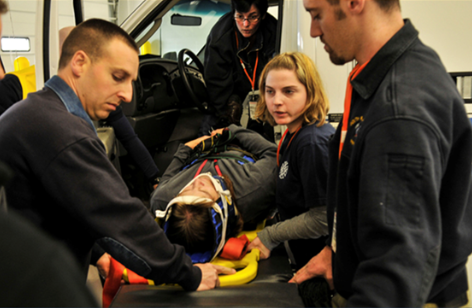
On April 4, Gov. Kathy Hochul announced New York’s inaugural mental health needs assessment for first responders, a collaboration between the state Division of Homeland Security and Emergency Services (DHSES), SUNY New Paltz’s Institute for Disaster Mental Health (IDMH) and the Benjamin Center, New Paltz’s research institute.
Firefighters, police, EMTs, 911 dispatchers and emergency managers across the state were welcomed to participate in this voluntary anonymous survey about mental health struggles within their fields. Along with these struggles, the survey prompted participants on the barriers and stigma that may prevent workers from seeking help.
This survey is not the first collaboration between the groups; DHSES frequently works with IDMH to sponsor their annual conference. This year, the institute will hold their 19th annual conference on May 14 — 15 at the Culinary Institute of America with the support of DHSES and New York State Office of Mental Health (OMH). The event, titled “Beyond the Call: Sustaining Resilience in the Responder Community,” will give insight into the hurdles first responders face when it comes to mental wellness, with a lineup of mental health professional and first responder speakers. At the conference, DHSES, IDMH and the Benjamin Center will deliver the results of the mental health assessment.
After 6,003 responses to the survey, Robin Jacobowitz, the director of education projects at the Benjamin Center, is now in the process of analyzing the data with the help of Jesse Hazard, a fourth-year political science major at SUNY New Paltz.
“We’re finding that first responders in general feel like there needs to be better services,” Jacobowitz said. “They’re worried about how they’ll be perceived and how management or leadership will perceive them. They’re concerned about their ability to find mental health providers that actually understand their experience, what it really means to be a first responder, and then be able to offer care that is aligned with their experience.”
This assessment is just one in a series of movements for the state to understand and support the mental struggles of public safety professionals on a deeper level. DHSES, IDMH and OMH are currently collaborating to develop a statewide disaster mental health team. Responders trained for this initiative will serve as psychological support to those affected and overwhelmed by disasters; through the help of federal funding, OMH is planning to support local and regional teams.
Additionally, these same collaborators are providing mental-health-related training opportunities for first responders. Their peer-to-peer courses offered at the State Preparedness Training Center have been particularly successful, with their two recent peer support team training sessions titled “Assisting Individuals in Crisis” and “Group Crisis Intervention,” both reaching capacity. More trainings are planned for this year.
Despite creating a more open conversation around mental health, issues with stigma still prevent some workers from coming to peers with their struggles.
Amy Nitza, executive director of the IDMH said, “It’s not a one-size-fits-all. What we need is a range of options from really good professional mental health services that are competent to peer services.”
With the results of this assessment, IDMH and the Benjamin Center both hope to see a variety of supportive programs and changes made to better accommodate first responder needs.
“The intent is that this data will inform some policy making and some practice around better services for mental mental health first responders,” Jacobowitz said.
